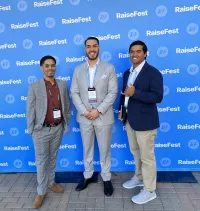
WORLD VISION COMMUNITY BLOG

How to Confidently Evaluate a Real Estate Investment Opportunity as a Passive Investor
"An investment in knowledge pays the best interest." – Benjamin Franklin
You Don’t Have to Be the Operator to Be an Educated Investor
You’ve worked hard to build some capital and now you’re looking for a way to grow it without trading more time for money. Passive real estate investing can be the ideal path. But handing over your cash to someone else (even a seasoned operator) can feel like a leap of faith especially when you're not involved in the day-to-day.
That’s why understanding how to evaluate a real estate opportunity even as a passive investor is one of the most empowering things you can do. You don’t need to be an expert in construction budgets or debt structuring, but you do need to know how to spot a solid opportunity vs. a risky gamble.
Let’s break down the most important things to look for.
1. Start with the Sponsor, Not the Deal
The most critical element in any real estate investment? The team running the show.
You’re not just investing in real estate you’re investing in the people who will make or break the deal. Focus on:
Track Record: Have they gone full cycle (bought, operated, and sold) on multiple deals?
Transparency: Do they communicate clearly, provide regular updates, and explain their assumptions?
Alignment of Interests: Are they personally investing in the deal? Is their compensation heavily performance-based?
Red flag: If the sponsor avoids tough questions or glosses over the risk factors, proceed with caution.
2. Understand the Business Plan
Passive investing doesn’t mean “blind investing.” Make sure the business plan is clear and matches your risk tolerance.
Ask:
What’s the strategy? Is it core, value-add, or opportunistic?
Is there construction or renovation involved? If so, what’s the timeline?
What’s the projected hold period? Typically 3–7 years.
How are they increasing income or reducing expenses?
You’re looking for a plan that’s realistic, not aggressive especially in today's volatile interest rate environment.
3. Evaluate the Return Profile (But Don’t Chase Numbers)
It’s tempting to get drawn to deals promising sky-high returns. But focus on risk-adjusted returns — not just raw percentages.
Key metrics to review:
Preferred Return: What’s the minimum return before the sponsor gets paid? (Often 6–8%)
IRR (Internal Rate of Return): Targeting 15–18% is typical for value-add deals.
Equity Multiple: This tells you how much your investment could grow over the life of the deal (2x = doubling your money).
Cash-on-Cash Return: How much income you’ll receive each year — great for investors needing passive cash flow.
Make sure the return profile matches your goals: steady income vs. long-term growth.
4. Assess Risk Mitigation Strategies
Every investment has risk but the best sponsors have a plan for downside protection.
Look for:
Stress Testing: Have they modeled what happens if rent growth slows or interest rates rise?
Debt Structure: Is it fixed or floating? How long is the loan term? Do they have rate caps?
Reserves: Is there enough money set aside for unexpected repairs or vacancies?
Market Fundamentals: Is the deal in a growing market with strong job growth and in-migration?
The goal isn’t zero risk it’s intelligent risk with buffers built in.
5. Review the Investment Structure
Before you sign anything, understand how you (the LP or Limited Partner) get paid — and when.
Common questions:
What’s the split? 70/30 or 80/20 (LP/GP) is common but make sure it shifts only after investors get their preferred return.
Is there a catch-up clause? This can significantly affect your share of profits.
How are distributions handled? Monthly or quarterly?
Ask for a copy of the PPM (Private Placement Memorandum) and Operating Agreement and actually read them (or have your CPA/attorney review them).
Practical Recommendations
Create a Sponsor Scorecard: Track key traits and red flags across different operators.
Join Investor Webinars: These are goldmines for hearing how sponsors think and communicate.
Ask Better Questions: The quality of your questions = the quality of your confidence.
Talk to Other Investors: Ask previous LPs what their experience has been like.
Be Passive, Not Powerless
Passive investing is powerful but only when paired with intentional decision-making. You don’t have to become a full-time underwriter to protect your capital. By learning how to evaluate a deal, you turn fear into confidence and guesswork into strategy.
The more educated you are, the more your money works for you not the other way around.
Ready to see what a well-vetted deal looks like?
Join our Investor Club and get access to exclusive opportunities built for long-term freedom.
FAQS
WORLD VISION COMMUNITY BLOG

How to Confidently Evaluate a Real Estate Investment Opportunity as a Passive Investor
"An investment in knowledge pays the best interest." – Benjamin Franklin
You Don’t Have to Be the Operator to Be an Educated Investor
You’ve worked hard to build some capital and now you’re looking for a way to grow it without trading more time for money. Passive real estate investing can be the ideal path. But handing over your cash to someone else (even a seasoned operator) can feel like a leap of faith especially when you're not involved in the day-to-day.
That’s why understanding how to evaluate a real estate opportunity even as a passive investor is one of the most empowering things you can do. You don’t need to be an expert in construction budgets or debt structuring, but you do need to know how to spot a solid opportunity vs. a risky gamble.
Let’s break down the most important things to look for.
1. Start with the Sponsor, Not the Deal
The most critical element in any real estate investment? The team running the show.
You’re not just investing in real estate you’re investing in the people who will make or break the deal. Focus on:
Track Record: Have they gone full cycle (bought, operated, and sold) on multiple deals?
Transparency: Do they communicate clearly, provide regular updates, and explain their assumptions?
Alignment of Interests: Are they personally investing in the deal? Is their compensation heavily performance-based?
Red flag: If the sponsor avoids tough questions or glosses over the risk factors, proceed with caution.
2. Understand the Business Plan
Passive investing doesn’t mean “blind investing.” Make sure the business plan is clear and matches your risk tolerance.
Ask:
What’s the strategy? Is it core, value-add, or opportunistic?
Is there construction or renovation involved? If so, what’s the timeline?
What’s the projected hold period? Typically 3–7 years.
How are they increasing income or reducing expenses?
You’re looking for a plan that’s realistic, not aggressive especially in today's volatile interest rate environment.
3. Evaluate the Return Profile (But Don’t Chase Numbers)
It’s tempting to get drawn to deals promising sky-high returns. But focus on risk-adjusted returns — not just raw percentages.
Key metrics to review:
Preferred Return: What’s the minimum return before the sponsor gets paid? (Often 6–8%)
IRR (Internal Rate of Return): Targeting 15–18% is typical for value-add deals.
Equity Multiple: This tells you how much your investment could grow over the life of the deal (2x = doubling your money).
Cash-on-Cash Return: How much income you’ll receive each year — great for investors needing passive cash flow.
Make sure the return profile matches your goals: steady income vs. long-term growth.
4. Assess Risk Mitigation Strategies
Every investment has risk but the best sponsors have a plan for downside protection.
Look for:
Stress Testing: Have they modeled what happens if rent growth slows or interest rates rise?
Debt Structure: Is it fixed or floating? How long is the loan term? Do they have rate caps?
Reserves: Is there enough money set aside for unexpected repairs or vacancies?
Market Fundamentals: Is the deal in a growing market with strong job growth and in-migration?
The goal isn’t zero risk it’s intelligent risk with buffers built in.
5. Review the Investment Structure
Before you sign anything, understand how you (the LP or Limited Partner) get paid — and when.
Common questions:
What’s the split? 70/30 or 80/20 (LP/GP) is common but make sure it shifts only after investors get their preferred return.
Is there a catch-up clause? This can significantly affect your share of profits.
How are distributions handled? Monthly or quarterly?
Ask for a copy of the PPM (Private Placement Memorandum) and Operating Agreement and actually read them (or have your CPA/attorney review them).
Practical Recommendations
Create a Sponsor Scorecard: Track key traits and red flags across different operators.
Join Investor Webinars: These are goldmines for hearing how sponsors think and communicate.
Ask Better Questions: The quality of your questions = the quality of your confidence.
Talk to Other Investors: Ask previous LPs what their experience has been like.
Be Passive, Not Powerless
Passive investing is powerful but only when paired with intentional decision-making. You don’t have to become a full-time underwriter to protect your capital. By learning how to evaluate a deal, you turn fear into confidence and guesswork into strategy.
The more educated you are, the more your money works for you not the other way around.
Ready to see what a well-vetted deal looks like?
Join our Investor Club and get access to exclusive opportunities built for long-term freedom.
LEARN WHAT PASSIVE REAL ESTATE INVESTING CAN DO FOR YOU AND YOUR FAMILY!
LEARN WHAT PASSIVE REAL ESTATE INVESTING CAN DO FOR YOU AND YOUR FAMILY!

WV Capital Holdings does not make investment recommendations, and no communication through this website or in any other medium should be construed as such. Investment opportunities posted on this website are "private placements" of securities that are not publicly traded, are subject to holding period requirements, and are intended for investors who do not need a liquid investment. Private placement investments are NOT bank deposits (and thus NOT insured by the FDIC or by any other federal governmental agency), are NOT guaranteed by WV Capital Holdings and may lose value. Neither the Securities and Exchange Commission nor any federal or state securities commission or regulatory authority has recommended or approved any investment or the accuracy or completeness of any of the information or materials provided by or through the website. Investors must be able to afford the loss of their entire investment. Any financial projections or returns shown on the website are estimated predictions of performance only, are hypothetical, are not based on actual investment results and are not guarantees of future results. Estimated projections do not represent or guarantee the actual results of any transaction, and no representation is made that any transaction will, or is likely to, achieve results or profits similar to those shown. Any investment information contained herein has been secured from sources that WV Capital Holdings believes are reliable, but we make no representations or warranties as to the accuracy of such information and accept no liability therefor. Offers to sell, or the solicitations of offers to buy, any security can only be made through official offering documents that contain important information about risks, fees and expenses. Investors should conduct their own due diligence, not rely on the financial assumptions or estimates displayed on this website, and are encouraged to consult with a financial advisor, attorney, accountant, and any other professional that can help you to understand and assess the risks associated with any investment opportunity. Investments in private placements involve a high degree of risk and may result in a partial or total loss of your investment. Private placements are generally illiquid investments. Investors should consult with their investment, legal, and tax advisors regarding any private placement investment.
QUICK LINKS

WV Capital Holdings specializes in value-add multifamily real estate and exhibits an expertise in maximizing value on every asset we acquire. Rather than attempting to predict the market cycles, we strive to acquire cash flowing apartment communities within medium and larger US metro.
© 2024 WV Capital Holdings. All Rights Reserved.

